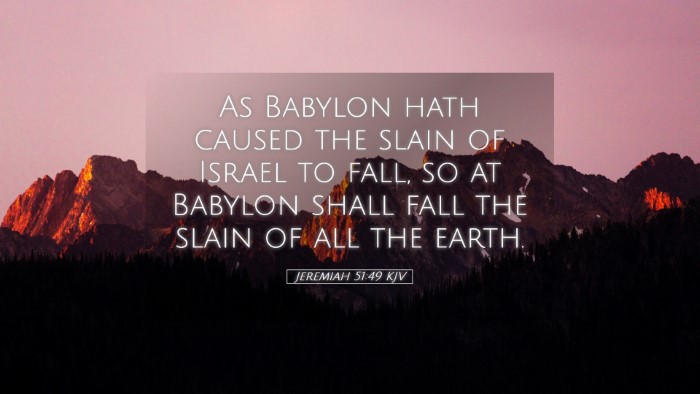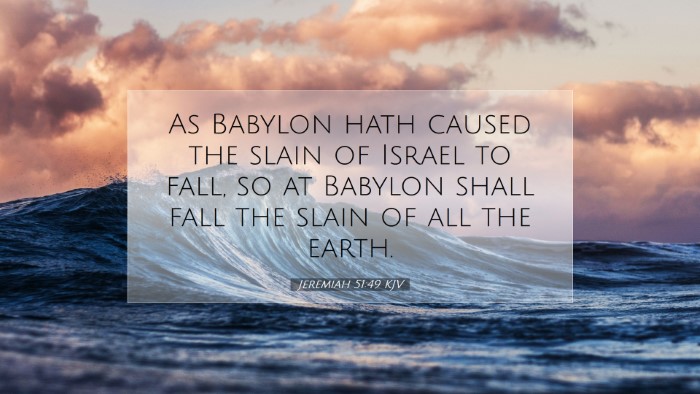Commentary on Jeremiah 51:49
Jeremiah 51:49 states:
"As Babylon hath caused the slain of Israel to fall, so at Babylon shall fall the slain of all the earth."
Contextual Overview
In this verse, the prophet Jeremiah addresses the impending judgment on Babylon, portraying the city as a representative of all nations that oppose God. Jeremiah's prophecies against Babylon are extensive, with a crucial emphasis on divine retribution for the atrocities committed, particularly against Israel. The verse encapsulates a broader theme of justice and the inevitable downfall of oppressive nations.
Insights from Public Domain Commentaries
Matthew Henry's Commentary
Matthew Henry highlights the poetic nature of the prophecy, emphasizing the symmetry in divine justice where the oppressor, represented by Babylon, will experience the same fate as those they have slain. He notes that just as Babylon has contributed to the downfall of the Israelites, so shall it also fall under divine judgment. Henry underlines the significance of this statement as a reminder of God's sovereignty over nations and His ability to protect His people.
- Illustration of Justice: Henry emphasizes that Babylon's fall is not simply a political occurrence, but a manifestation of divine justice.
- God's Sovereignty: This commentary reflects a theological emphasis on God’s ultimate authority over earthly kingdoms.
Albert Barnes' Commentary
Albert Barnes draws attention to the metaphorical language used in Jeremiah 51:49, interpreting the “slain of Israel” as a symbol of the large-scale suffering inflicted by Babylon. He argues that the verse serves as a warning to those who stand against God’s chosen people. Barnes believes that this scriptural passage illustrates a duality of judgment: not only will Babylon suffer for its sins, but this suffering is representative of a broader divine principle affecting all nations that rise against Israel.
- Metaphorical Representation: He elucidates that Babylon’s downfall serves as an emblem for the downfall of all oppressors.
- Universal Principle: Barnes asserts that this prophecy extends beyond Babylon, reflecting a universal principle of retribution for nations opposing God's will.
Adam Clarke's Commentary
Adam Clarke offers an insightful analysis of the phrase “the slain of all the earth.” He asserts that this verse could be understood in the context of universal judgment, asserting that God’s justice is not confined to one nation but is a global principle. Clarke emphasizes that the judgment against Babylon is not solely retribution but also serves as a warning against arrogance and tyranny.
- Global Judgment: Clarke articulates a theological view that God’s justice transcends geographical boundaries.
- Warning Against Tyranny: He discusses the importance of humility before God and the dangers of pride and oppression.
Theological Implications
This verse illustrates core themes of the Bible, including God's justice, sovereignty, and faithfulness to His people. It serves as a poignant reminder that God will ultimately vindicate His people and judge those who act unjustly. The insights from these commentaries offer a framework for understanding the dual themes of warning and hope within the context of divine judgment.
Applications for Today
For pastors, theologians, and students of Scripture, Jeremiah 51:49 serves as a call to reflect on the justice of God in a world filled with oppression and violence. It provides a foundation for messages of hope for the oppressed and a warning for those who engage in unjust practices. The verse encourages believers to trust in God’s ultimate plan and to recognize that the trajectory of nations is firmly under His control.
- Encouragement for the Oppressed: This verse can be a source of comfort and hope for those who suffer injustice.
- Call to Accountability: It prompts leaders and individuals to act justly and humbly, recognizing that they are accountable to God.
Concluding Thoughts
Jeremiah 51:49 conveys a powerful message of judgment and hope. The commentaries reviewed provide a rich tapestry of insights—emphasizing themes of divine justice and the ultimate downfall of those who oppose God's will. For contemporary readers, this verse remains a pertinent reminder of God’s unwavering sovereignty and the moral imperative to pursue justice in a world often fraught with oppression.


